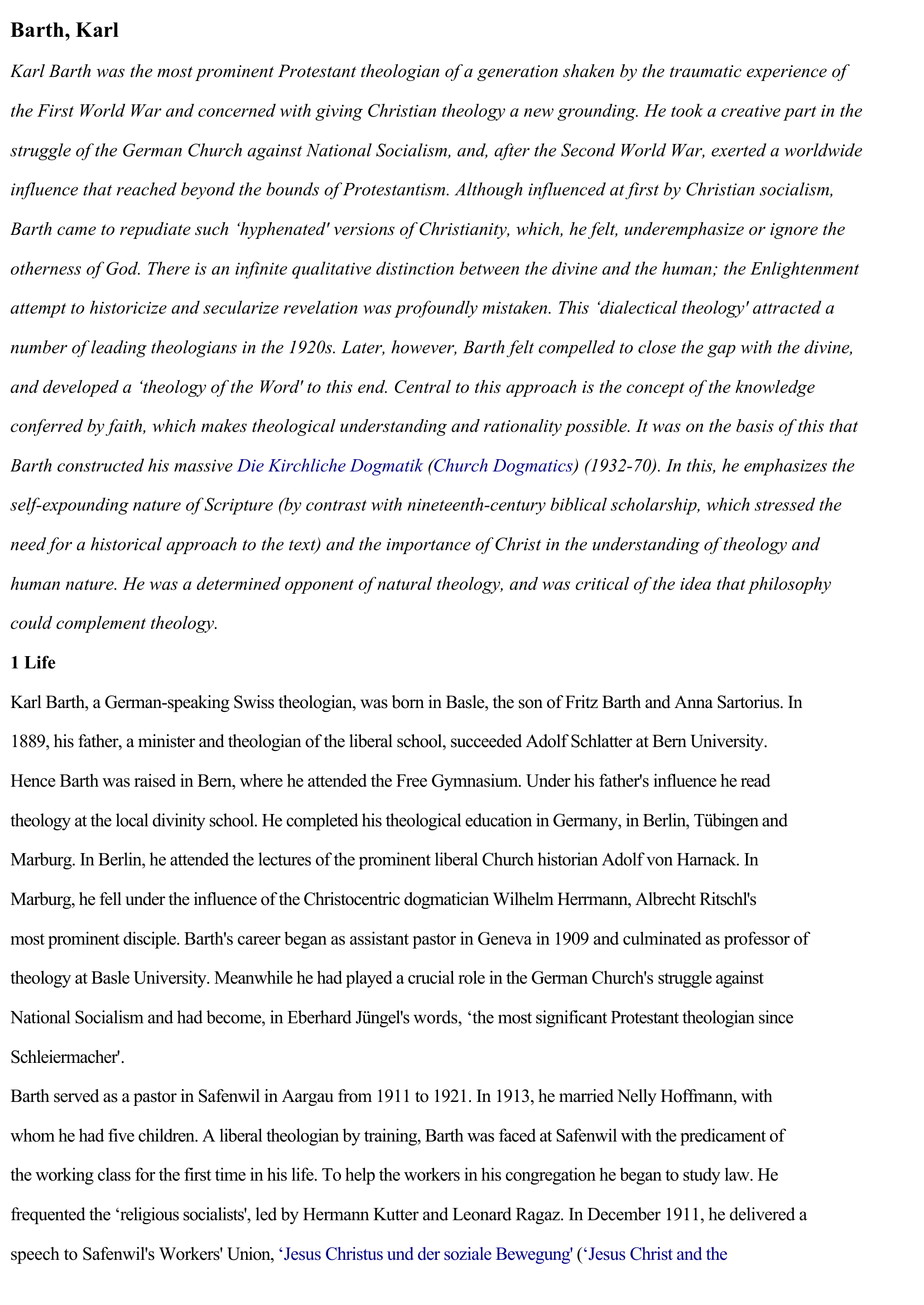Barth, Karl
Publié le 16/05/2020

Extrait du document
«
Barth, Karl
Karl Barth was the most prominent Protestant theologian of a generation shaken by the traumatic experience of
the First World War and concerned with giving Christian theology a new grounding.
He took a creative part in the
struggle of the German Church against National Socialism, and, after the Second World War, exerted a worldwide
influence that reached beyond the bounds of Protestantism.
Although influenced at first by Christian socialism,
Barth came to repudiate such ‘hyphenated' versions of Christianity, which, he felt, underemphasize or ignore the
otherness of God.
There is an infinite qualitative distinction between the divine and the human; the Enlightenment
attempt to historicize and secularize revelation was profoundly mistaken.
This ‘dialectical theology' attracted a
number of leading theologians in the 1920s.
Later, however, Barth felt compelled to close the gap with the divine,
and developed a ‘theology of the Word' to this end.
Central to this approach is the concept of the knowledge
conferred by faith, which makes theological understanding and rationality possible.
It was on the basis of this that
Barth constructed his massive Die Kirchliche Dogmatik (Church Dogmatics ) (1932-70).
In this, he emphasizes the
self-expounding nature of Scripture (by contrast with nineteenth-century biblical scholarship, which stressed the
need for a historical approach to the text) and the importance of Christ in the understanding of theology and
human nature.
He was a determined opponent of natural theology, and was critical of the idea that philosophy
could complement theology.
1 Life
Karl Barth, a German-speaking Swiss theologian, was born in Basle, the son of Fritz Barth and Anna Sartorius.
In
1889, his father, a minister and theologian of the liberal school, succeeded Adolf Schlatter at Bern University.
Hence Barth was raised in Bern, where he attended the Free Gymnasium.
Under his father's influence he read
theology at the local divinity school.
He completed his theological education in Germany, in Berlin, Tübingen and
Marburg.
In Berlin, he attended the lectures of the prominent liberal Church historian Adolf von Harnack.
In
Marburg, he fell under the influence of the Christocentric dogmatician Wilhelm Herrmann, Albrecht Ritschl's
most prominent disciple.
Barth's career began as assistant pastor in Geneva in 1909 and culminated as professor of
theology at Basle University.
Meanwhile he had played a crucial role in the German Church's struggle against
National Socialism and had become, in Eberhard Jüngel's words, ‘the most significant Protestant theologian since
Schleiermacher '.
Barth served as a pastor in Safenwil in Aargau from 1911 to 1921.
In 1913, he married Nelly Hoffmann, with
whom he had five children.
A liberal theologian by training, Barth was faced at Safenwil with the predicament of
the working class for the first time in his life.
To help the workers in his congregation he began to study law.
He
frequented the ‘religious socialists' , led by Hermann Kutter and Leonard Ragaz.
In December 1911, he delivered a
speech to Safenwil's Workers' Union, ‘Jesus Christus und der soziale Bewegung' (‘Jesus Christ and the.
»
↓↓↓ APERÇU DU DOCUMENT ↓↓↓
Liens utiles
- Barth, KarlBarth, Karl (1886-1968), théologien protestant suisse, considéré comme l'un des penseurs chrétiens les plus éminents du XXe siècle.
- Barth (Karl)
- BARTH, KARL
- Barth (Karl)
- Karl Popper - La logique de la decouverte scientifique


